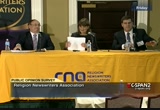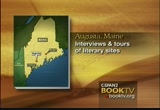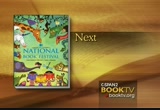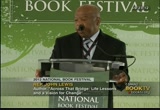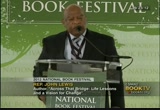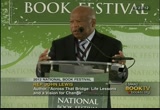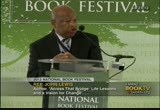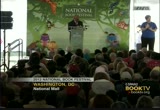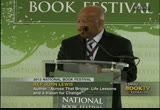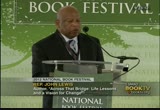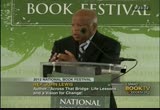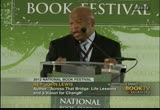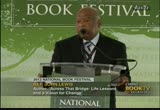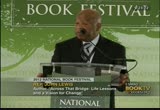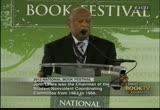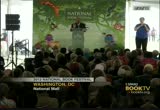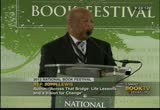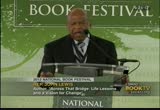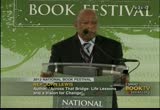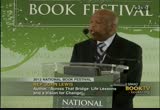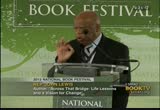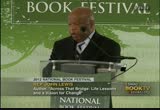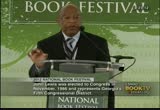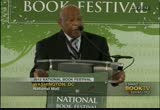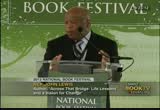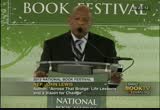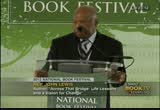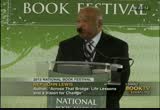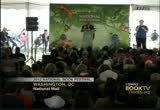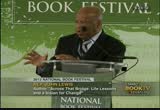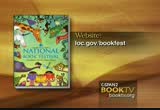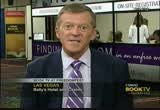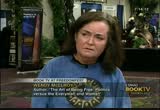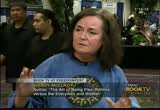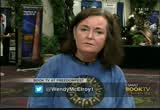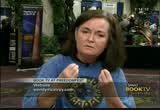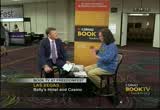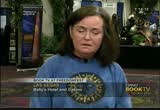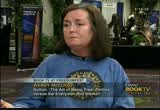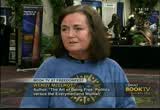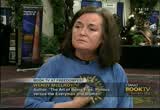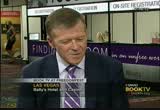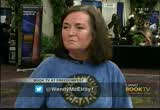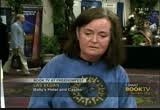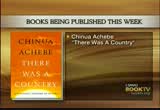tv Book TV CSPAN October 6, 2012 8:00am-8:45am EDT
8:01 am
8:02 am
presents his book "across that bridge." this is about 45 minutes. [applause] >> thank you so much. david, thank you for those kind words of introduction. mr. librarian, thank you for your leadership, for your vision, thank you for never ever giving up or never giving them. thank you for keeping your feet. i'm so delighted and pleased to be here this afternoon to see each and every one of you. you heard i grew up in a big city like washington, d.c. or a baltimore or silver springs or alexander. i grew up on a farm in rural
8:03 am
alabama about 50 miles from montgomery. outside of a little place called troy. my father was a sharecropper but in 1944 when i was only 4-years-old, my father saved $300 he bought 110 acres of land and there was a lot of cotton and corn, peanuts, cows and chickens. on the form of was my responsibility to care for the chickens and i fell in love with raising chickens like no one else could raise chickens. does anyone else anything about raising chickens? can i see your hands? okay let's have a little fun this afternoon. [laughter] they're able to place them on the setting hand for the chicks
8:04 am
to hatch some of you may be saying what were they able to? from time to time it began and you had to have fresh eggs. do you follow me? it's okay. it's all right. the chick would hatch i would take them and put them in a box with a lantern and raise them on their own or give them to another hen and do this for another three weeks. it was in the right thing to do. it wasn't the moral thing to do or the most loving thing to do or the most nonviolent thing to do to keep on cheating on these hens.
8:05 am
some of you may be old enough to remember especially in the midwest. are you old enough to remember the sears roebuck catalog? very good. that big book some called it the wish book but they kept wishing. i was never able to save $18.98 to order the most expensive incubator from the sears roebuck store so we kept cheating on the hens and we are not talking about eight or 9-years-old. i wanted to be a minister. i wanted to preach the gospel so from time to time with the help of my brothers and sisters and first cousin we would get them together in the chicken yard. [laughter]
8:06 am
and we would have church. my brothers and sisters and first cousin would lie in the outside of a guard and the congregation with the chickens and i would start speaking and preaching quote but when i looked back on that some of those chickens would not of their heads and shake their heads. i am convinced some of the most chickens i preached to in the 40's and 50's tended to listen to me better than my colleagues listen to me today in the congress. [applause] as a matter of fact some of them were just a little more productive. [applause] at least they produce eggs. that's enough about that story. but one thing they did is they taught me patience, to wait and
8:07 am
not get in a hurry, be patient, that the eggs would not hatch in one or two or three days but it would take three long weeks for those ends to hatch. the civil rights movement taught me patience, to never give up and never give in but keep your eyes on the prize, so this book, "across that bridge," is about patience, about steady hope, truce, love and reconciliation. when i was growing up in
8:08 am
alabama, visit the tuskegee and later starred in national tennessee and lived in alana. sissons salles white men, colored men, white women, colored women. when i was a child with my mother, father, parents and grandparents why? and they would say that's the way it is. don't get in the way. don't get in trouble. but 1955 at the age of 15i heard of rosa parks. i heard of martin luther king, jr.. at the age of 17 aye rosa parks. the next year at the age of 18i met dr. martin luther king jr.. the action of rosa parks to the people of montgomery and teaching the leadership of dr. king inspired me to get in the way to get in trouble so for more than 50 years i've been in
8:09 am
trouble, unnecessary trouble. [applause] so, across that bridge is a lesson about getting in trouble, and that's what - in america today we need for people to get in trouble, good trouble. [applause] to believe in something that is right and the year and necessary but before we got in any trouble as students and young people we studied. we didn't wake up one morning and say we are going to sit in. we didn't just dream monday we were going to come to washington for march on washington as we did in 1963 from selma to montgomery as we did in 1965.
8:10 am
we study and prepare ourselves as college students in high school students in the city of nashville every tuesday night for an entire year a group of us would meet at 6:30 p.m., what gandhi attempted to do in south africa and accomplished in india. a civil disobedience, we studied the great religion of the world, we studied for what dr. martin luther king, jr. was all about and we were ready and we would be standing and at the theater were going on a freedom ride and we would be beaten. but we didn't strike back as a way of living in a way of life
8:11 am
that is better to love than to hate. we wanted to build a love of community and be reconciled so this book is also about reconciliation to give you one example. i first came to washington, d.c. the first, 1961 to go on something called the freedom ride. 13 of us, seven white and 14 african-american. we came here on may 1st and studied and participated in non-violent workshops and i will lover frigate on the night of may 3rd someplace in downtown rest pete -- washington we went into a restaurant and i had never been to a chinese restaurant or had a meal at a chinese restaurant. that night we had a wonderful
8:12 am
meal. the food was good, and someone said you should eat well because this might be like the last supper. the next day, may 4th, 1961, we left washington driven from here on our way to new orleans. the first incident occurred in charlotte north carolina. back in 1961 black people and white people couldn't be seated together on a greyhound bus. the same waiting room and restroom facilities. segregation was the order of the david in charlotte north carolina in may of 1961 a young african-american man entered a so-called white waiting room. he went into plater -- waiting remain the leader the barbershop
8:13 am
to get a shoe shine and was arrested and taken to jail. the next day went to trial and the judges dismissed the charges against him. the same afternoon my seatmate, a young gentleman by the name of aber from connecticut real we tried to enter a so-called white waiting room and we were met by a group of men who beat us and left us lobbying in a pool of blood. the local authorities came up and wanted to know whether we wanted to press charges. we said no, we believe in peace and nonviolence. that was may 9, 1961. in february 09, less than a month after president barack
8:14 am
obama had been inaugurated as president and another man that has attacked us came to the congressional office here on capitol hill and said i'm one of the people that beat you. will you forgive me? i want to apologize. his son had been encouraging to see killed the people that he had attacked. i said yes i accept your apology. i forgive you. his son started crying and he started crying, i started crying. he gave me a hug and i hugged him back. i have seen him three of her times. he called me brother and i called him brother. that is what the movement was about, reconciliation. this book is about reconciliation. [applause] we are one people, we are one family, we are one house.
8:15 am
we must be reconciled. of those of us who live here in america, those of us who live here on this piece of real estate were born to live together as brothers and sisters. the late a. philip randolph, who was the dean of the civil rights movement and black leadership, who had of the idea about the march on washington almost 50 years ago said from time to time may be our mothers and fathers all came to this great land in different shifts but we are in the same boat now. final analysis, it doesn't matter we are black or white, latino, asian american or native american. it doesn't matter whether we are a democrat or republican. it doesn't matter whether we are
8:16 am
straight or gay. it doesn't matter whether we are jewish or muslim or christians. we are one people, one family, one house. [applause] this book "across that bridge" in effect our struggle is not a struggle to redeem the soul of america. it's not a struggle that lasts one day, one week, one month or one lifetime. maybe you would take more than one lifetime to create a more perfect union, to create the beloved community. and you heard david tell you why did get a rest at few times, and
8:17 am
young people, young children say how can you be in the congress if you got arrested? [laughter] you violated the law. and i said they were bad laws. their customs, they were tradition, and we wanted america to be better to live up to the declaration of independence, make real our democracy. when i got arrested the first time this books and i felt free. i felt liberated and today more than ever i feel free in the liberated. abraham lincoln 150 years ago freed the slaves but it took the modern-day civil rights movement to elaborate a nation.
8:18 am
[applause] i know some of you are asking where did you get the name "across that bridge," where do to get the title from, life lessons and the vision for change? just like a few short years ago since this is an election year, hundreds and thousands and millions of people come in 11 states and the old confederacy from virginia to texas couldn't register to vote simply cause of the color of their skin. people stood in line. it took a state like the state of mississippi in 1963, 1964, 1965 more than four need to keep those in the but only about 16 those and were registered to vote. there was a county in my native state of alabama and the heart of the black belt.
8:19 am
am i population was more than 80% but there wasn't a single registered black voters in the county. a little town of selma alabama 2.1 were registered to vote. people were beaten and jailed. on one occasion a man was asked to borrow another soap and count the number of jellybeans in a jar. there were african-american lawyers, teachers and doctors come college professors failing the test and had to pay a tax and we had to change that. hundreds had been arrested and jailed. my goal organization the student
8:20 am
nonviolent coordinating committee better known as sncc. [applause] thank you. some of you remember. more than a thousand students black-and-white color the students came self and worked. the night of june 1st 1964, 3 young men that i knew, too young white men and one young african-american men went out to investigate the burning of an african-american church. was stopped, arrested, taken to jail and later the same evening they were taken from jail, turned over to the clan where they were beaten, shot and
8:21 am
killed. these three young men didn't die in vietnam. they didn't die in the middle east or eastern europe, they didn't die in africa, they died right here in our own country trying to get people to become participants in a space process. [applause] and right now there's an attempt for both democrats and republicans to get the postal service to issue a stamp in honor of these three young men. [applause] so, we had to organize and mobilize and speegap and speegap we had to get in trouble, good trouble, unnecessary trouble.
8:22 am
after dr. martin luther king had received a peace prize in december, 1964 after president johnson found the civil rights act dr. king had a meeting when he returned from europe and told him we needed a voting rights act and president lyndon johnson told dr. king to get a vote passed i just signed the civil rights act. dr. martin luther king, jr. can back to atlanta and met with a group of us have is that we will write that act. my organization sncc was already involved in selma, the heart of the black belt. the only time a person could even attempt to register to vote was fired and first monday of each month. you have to vote a set of steps through a set of double doors and get a copy of the so-called,
8:23 am
and very few people were able to pass that test. today's lead in february, 1963, 1965, there was a protest in marion alabama 30 miles from selma. marion alabama is the home town of margin of the king jr. and incident occurred. a young man by the name of jimmy jackson tried to protect his mother who was shot by a state trooper and a few days later he died in a hospital and because what happened to him we decided to march from selma to montgomery sunday march 7, 1965 about this time of day, 600 of us have participated in a non-violent workshop and up to
8:24 am
block the 50 miles from selma to montgomery and to the world the people of color in alabama wanted to register to vote. during those days, i had all of my hair and i was a few pounds lighter. i was wearing a backpack before it became fashionable to wear backpacks and i had to books. i'm going to be arrested and go to jail so i wanted to have something to read. i had an apple and an orange. i wanted to have something to eat. toothpaste and toothbrushes thought i was going to be in jail with my friends and colleagues and neighbors. i wanted to be able to brush my teeth. as we were crossing the alabama
8:25 am
river, my colleague walking beside me said to me can you swim? he saw the water down below i said can use when he said yes, a little. we continued to walk and we came to the highest point on the bridge and down below we solve the state troopers and continued to block. we came within a distance of the troopers and a member of the state troopers said i am the major and this is in on wall for march will not be able to continue, i give you three minutes to disperse and return to your troops. he said major, give us a moment to pray. before we can tell the people behind us the same words to pray
8:26 am
the trooper said troopers our defense. these men put on their death mask and came at us with sticks trembling as with horses and releasing tear-gas. i was hit in the head by a trooper with a stick, had a concussion and i thought i was going to die. i thought i saw death. 47 years later i don't recall how i don't know how i made it past that bridge but i do remember in that little church more than 2,000 people were trying to get in to protest what had happened on the bridge and someone said something to the audience. i stood up and i said i don't
8:27 am
understand how president johnson can't send troops to vietnam and cannot send troops to selma alabama to protect people whose only desire is to get ready to register to vote, to march from selma to montgomery. 17 of us were hurt and admitted to a local hospital. the next day dr. martin luther king jr. came to selma to visit with us and he said that he asked religious leaders to come. more than a thousand priests, rabbis came and walked across the bridge. [applause] so, we made a lot of progress but there are still other bridges that we need to cross to create a more perfect union, to create the beloved community henry game but the cost of that
8:28 am
day president lyndon johnson came to the congress on march 15th and made one of the speeches that any american president had made in modern times on the question of civil rights and voting rights. we called it the we shall overcome speech. he started out by saying i speak the night for democracy and he went on to say it is in a single place in the search for freedom so it was more than a century ago, so it was last week in selma alabama. he condemned this violence and introduced the act and before he concluded this beach, he said we shall overcome.
8:29 am
i looked at dr. martin luther king jr.. we were watching johnson and listening as a local family in selma. i looked at dr. king and he started crying and we all started crying to hear the president of the united states using the theme song of the civil rights movement and we shall overcome. there are other bridges to cross and we must cross them with faith, hope, love, peace and be reconciled with our brothers and sisters because we are one family. we are one house. we live in the same house, the american house and continue to cross that bridge. thank you very much. [applause] this event was part of the 2012
8:30 am
8:31 am
fest 2012 loss vegas a libertarian gathering that is held annually and we've been talking with several different authors and we want to introduce you to another author right now whose book is called the art of being a free politics versus every man and woman. first tell us about yourself. >> i'm an individual feminist and i've been in libertarianism for 40 years now since i was 14-years-old. this look is my reaction to 9/11 basically. when 9/11 happened, i started to rethink everything about libertarianism and everything about my belief system. i saw the blue state rise
8:32 am
quickly after 9/11 so effortlessly. america gave up on freedom all in one moment, and i did a lot of think about my relationship to the state and with the state was, how important it was to my life and how amazing that responsibility of life if you want was called the business of living. as a result i read a book that gave the theory, the history and the psychology if you would behind my response to that whole system of thinking after 9/11 where nine basically tired of dealing with freedom as an abstraction and i'm not
8:33 am
disrespecting anyone who wants to be big liberty -- debate liberty. i just want to be free in my lifetime. >> what do you changing your thinking after 9/11 and what do you find of your previous thinking? concrete example. >> one attitude towards the state with david friedman he said if you translate it into english and went along the lines of its against the hagues of the government which is you blame every single mistake and work against the state. on the other hand, i mentioned henry david who was pivotal in
8:34 am
my thinking. he basically had the idea of not the idea of living but he went out on civil disobedience to the hill and saw this absolute duty that surrounded him. i want to look around myself and say here there is no state. i try to do that every day by making sure i can see everything from interacting with my neighbors in the sense of exchange and privatizing my life, taking my life back from the state and privatizing it to the extent possible do i interject in the state and make sure you go into businesses that
8:35 am
are privatizing government services. we are going to an unprecedented period of the state control and i'm not saying that you should marker yourself or your family. that would be reckless. to the extent possible privatize your own personal life. >> does that mean you are living off the grid and not flying on their plans because of tsa and all the different regulations. are those the types of things you are not doing any more? >> i cannot tell anyone what to do in their lives and i'm not trying to to the extent possible use alternative currencies come and use the gold market, go private. don't use the government.
8:36 am
this book -- and i don't mean to misrepresent it because it is more historical in the background underpinning of financing and i am writing another book right now that will be more of a cow to. the whole idea this is basically psychologically preparing people for the fact they are living in a police state. we are not coming to a police state, we are living in it. you must ask yourself questions and prepare yourself how long you want to delay and when you will do if certain situations come up. being free is no longer something that you take for granted. >> who is batey chadwig?
8:37 am
>> he is amanda was in jail for many years even though he committed no crime. he had been convicted of nothing. what was once an imprisonment deutsch to content -- deutsch to contempt. in the american court system you go in and you are divorcing your wife and she alleges that you have hidden assets. the judge says i think he does pity even though it's not proven. he went to jail for something like ten, 12 years because he refused to turn over records to a judge. that's civil contempt and you
8:38 am
can be imprisoned for far longer on in civil contempt charge, grand criminal because you don't have the right to appeal, you don't have the right to have a judge, to have a lawyer, you don't have the due process rights that you have in a criminal case so there are situations in the system people are not aware of that average people like you and me. >> is it just the state that concerns you? what about in today's world, corporations, when we do searches on the internet or use our credit cards and now features are tracked with a cell phones and all that information is out there? >> i am of course concerned with the ordinary citizens being criminal which is what you're talking about if you're saying i'm concerned with corporations
8:39 am
i have a hard time drawing a line between the state and corporations i don't think corporations as they are today could exist unless they had stayed privilege and limited life of the and it sounds like an slaming big business. i'm not. they should get as big as they possibly can in the free market complex. let it process. if you're asking about the privacy issue coming this, of course everyone will go after mauney data coming yours and mine because they can make a buck off event. as long as i have the ability to say no and shut the door which the state doesn't let me do but i would have the ability in the free market as long as i am able to do that then it's up to me.
8:40 am
the response of these on me to slam that door and say it is my own business. >> wendy mcelroy why do you think the post office is harmful? >> the post office percival is considered to be an institution that is from a platform of service. throughout the decades from the very beginning when it is established after the founding fathers centered, the antifederalists were centered. any government agency is going to serve a government purpose beyond the service it purports to provide the public. only government agency to order
8:41 am
that. >> most libertarians anarchist? you describe yourself. [inaudible] [laughter] are the anarchists' the same? is there an overlap between anarchists and libertarian? >> there's a lot of overlap and they often described themselves as libertarian. [inaudible] he said the government that governs best governs least. i have that view in the power and more able to empower the
8:42 am
government want to put in power i would hang up my credentials [inaudible] i wouldn't have to buy the tomatoes the state is making me too busy to grow. i don't have much argument with most libertarians. if they saw their government the wouldn't see me again. >> wendy mcelroy as the author of the art of being freed and the back of the book published by laissez-faire book with an invitation. >> it is a book club and something i'm very excited about if you go to the site, lfb.com, wendy mcelroy you'll find a community of people. people like me and jeff tucker are trying to find how to live
8:43 am
liberty and we are tired of being depressed and looking at the state. that is a valid response and i can't help from losing the the fact of the matter is we want to live free and know how to grow tomatoes and like our neighbors and the valuable members of the community. i would rather be a good neighbor than a good libertarian. i don't think the conflict is there. >> wendy mcelroy is the our author of the art of being free. you are watching book tv on c-span2.
163 Views
IN COLLECTIONS
CSPAN2 Television Archive
Television Archive  Television Archive News Search Service
Television Archive News Search Service 
Uploaded by TV Archive on

 Live Music Archive
Live Music Archive Librivox Free Audio
Librivox Free Audio Metropolitan Museum
Metropolitan Museum Cleveland Museum of Art
Cleveland Museum of Art Internet Arcade
Internet Arcade Console Living Room
Console Living Room Books to Borrow
Books to Borrow Open Library
Open Library TV News
TV News Understanding 9/11
Understanding 9/11